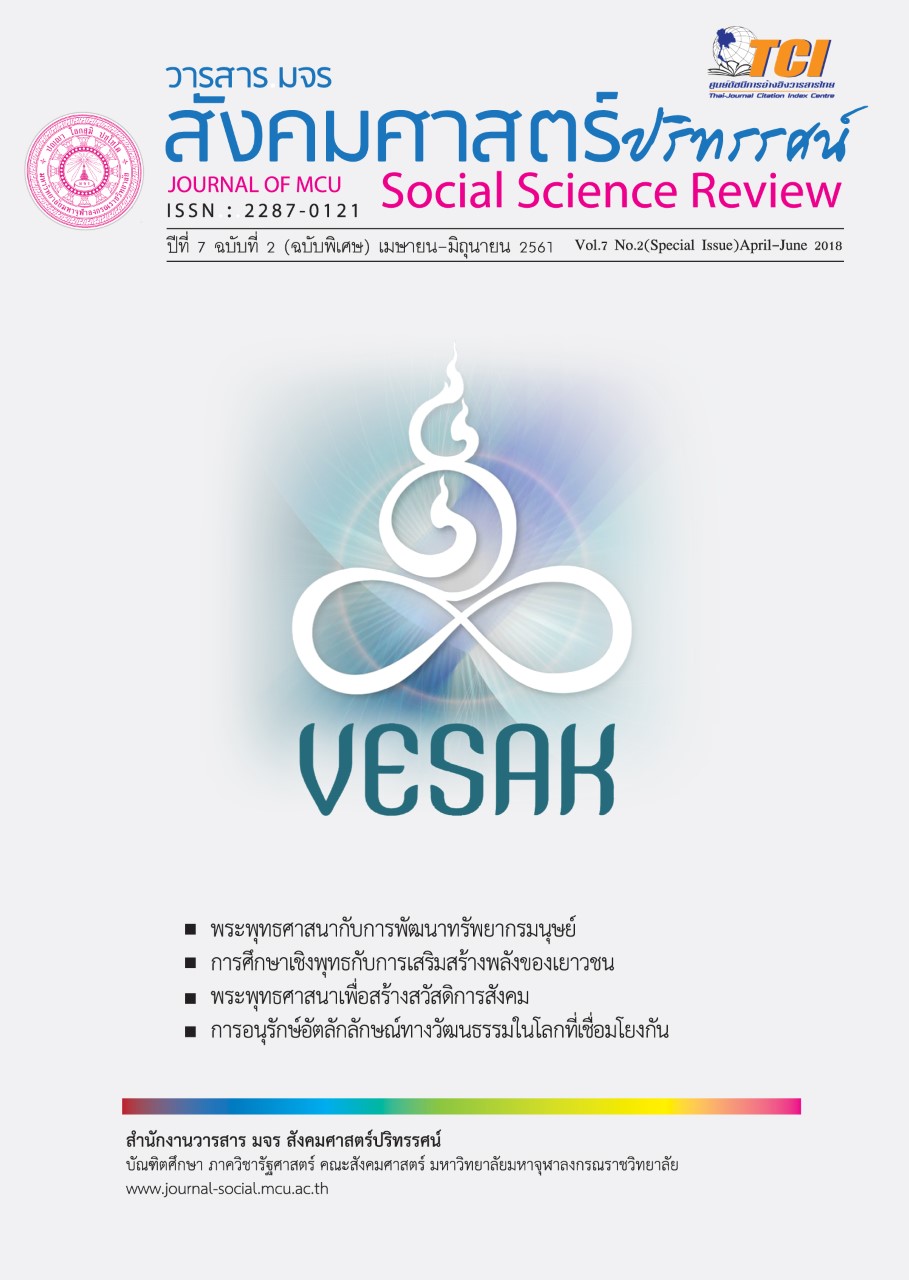รูปแบบการพัฒนาการบริหารจัดการสหกรณ์ออมทรัพย์ที่มีประสิทธิผล ตามหลักพุทธธรรม
บทคัดย่อ
บทความเรื่อง รูปแบบการพัฒนาการบริหารจัดการสหกรณ์ออมทรัพย์ที่มีประสิทธิผล ตามหลักพุทธธรรม มีวัตถุประสงค์ 1) เพื่อศึกษาสภาพ ปัญหาและอุปสรรคการบริหารจัดการสหกรณ์ออมทรัพย์ 2) เพื่อศึกษาปัจจัยที่มีประสิทธิผลของการบริหารจัดการของสหกรณ์ออมทรัพย์ตามหลักพุทธธรรม 3) เพื่อนำเสนอรูปแบบการพัฒนาการบริหารจัดการสหกรณ์ออมทรัพย์ที่มีประสิทธิผลตามหลักพุทธธรรม
การวิจัย ครั้งนี้เป็นงานวิจัยเชิงคุณภาพ ได้ศึกษาจากเอกสาร แนวคิด ทฤษฎีงานวิจัย ที่เกี่ยวกับการบริหารจัดการสหกรณ์ออมทรัพย์ นำหลักพุทธธรรมมาประยุกต์ใช้กับการบริหารจัดการสหกรณ์ออมทรัพย์ และทำการเก็บข้อมูลด้วยการสัมภาษณ์ เชิงลึก (In Depth Interview ) กับผู้ให้ข้อมูลสำคัญ (Key Informant) ในแต่ละสหกรณ์ออมทรัพย์จำนวน 20 คนและสัมภาษณ์พระสงฆ์ระดับผู้บริหารที่มีความรู้ความเข้าใจเกี่ยวกับหลักธรรมทางพุทธศาสนาในการบริหารจัดการ จำนวน 5 รูป รวมผู้ให้ข้อมูลสำคัญทั้งสิ้นจำนวน 25 รูป/คน สรุปรูปแบบการบริหารจัดการสหกรณ์ออมทรัพย์ที่มีประสิทธิผลตามหลักพุทธธรรมแล้ว นำมาจัดการสนทนากลุ่มเฉพาะจากผู้เชี่ยวชาญจำนวน 10 รูป/คน จึงทำการคิดวิเคราะห์เนื้อหา เพื่อจัดหมวดหมู่ของเนื้อหา แล้วนำมาสังเคราะห์เชิงระบบอย่างละเอียดลุ่มลึกหาประเด็นร่วมและประเด็นหลัก อธิบายเนื้อหาทีละประเด็นๆ
ผลการวิจัยพบว่า
- 1. สภาพปัญหาและอุปสรรคการบริหารจัดการสหกรณ์ออมทรัพย์ เป็นองค์กรไม่แสวงหาผลกำไร การบริหารจัดการสหกรณ์จึงมีลักษณะแตกต่างจากการจัดการธุรกิจอื่น เป็นสถาบันทางการเงินมีส่วนราชการกำกับจัดตั้งขึ้นให้การเอื้อเฟื้อแก่ชุมชนโดยทำกิจกรรมสาธารณะประโยชน์ในทุกๆปี คือกำไรกลับสู่ชุมชนและสังคมอย่างมีปัญหา คือ การบริหารจัดไม่มีปริสิทธิผลการทำงานไม่เป็นไปตามเป้าหมายอุปสรรค คือ การเปลี่ยนแปลงนโยบายของรัฐและของผู้บริหาร
- 2. ปัจจัยที่มีประสิทธิผลของการบริหารจัดการของสหกรณ์ออมทรัพย์ตามหลักพุทธธรรม มี 2 ปัจจัย ได้แก่ (1) ปัจจัยทฤษฎีการบริหารจัดการทั่วไป มี 7 ด้าน 1) การวางแผนอย่ามีหลักการ 2) การจัดองค์กรรู้เท่าทันสถานการณ์ 3) การจัดการทรัพยากรบุคคลอย่างมีศักยภาพ 4) การวินิจฉัยสั่งการอย่างมีความรับผิดชอบ 5) การประสารงานสร้างสรรค์โอกาส 6) การรายงานผลคุณธรรมจริยธรรม 7) การบริหารงบประมาณสร้างความเป็นธรรมนำสุขและ (2 ปัจจัยหลักพุทธธรรม มี 7 ด้าน 1) รู้จักกฎเกณฑ์แห่งเหตุผล 2)รู้จักผลรู้ประโยชน์ 3)รู้จักประเมินศักยภาพของตน 4)รู้จักประมาณรับจ่ายให้พอดี 5)รู้จักกาลอันเหมาะสมประกอบกิจ 6)รู้จักจารีตชุมชน 7)รู้จักเลือกคบบุคคล
3. รูปแบบการการพัฒนาบริหารจัดการสหกรณ์ออมทรัพย์ที่มีประสิทธิผล มี 7 รูปแบบ 1) รูปแบบการวางแผนที่มีหลักการ รู้จักผลที่เกิดขึ้นรู้จุดแข็งจุดอ่อน มุ่งวิสัยทัศน์
2) รูปแบบการจัดองค์กรที่รู้จักผลสัมฤทธิ์ รอบคอบชัดเจนรู้สถานการณ์ 3) รูปแบบการจัดการทรัพยากรบุคคลที่เน้นความรู้ความสามารถมิตรไมตรีจริงใจสุจริต มีความรับผิดชอบ 4) รูปแบบการวินิจฉัยสั่งการหรือการอำนวยการที่ยึดคำสั่งประกาศ ระบบคณะกรรมการ อำนาจหน้าที่ พอเพียง พอประมาณเที่ยงตรง 5) รูปแบบการประสารงานที่รู้จักกาลเทศ สร้างสรรค์โอกาสทันเหตุการณ์รู้เขารู้เรา 6) รูปแบบการรายงานผลที่มีประสิทธิผลเป็นเลิศ ประเมินผลงานคุณธรรมจริยธรรมรู้บุคคลที่มีส่วนได้เสียจริงใจต่อกัน 7) รูปแบบการบริหารงบประมาณที่เสมอภาคสร้างความเป็นธรรม มุ่งประโยชน์องค์กร
เอกสารอ้างอิง
Bass, Bernard M and Avolio, Bruce J.(1994). Improving Organization Effectiveness Trough Transformational Leadership Thousand Oaks : Sage.
Bennis, W., and Nanus., (1985). Leaders : The Strategies for Taking Change, New York: Harper and Row.
Savings Bank of Thailand Limited, (2017). Rallies of Savings Bank of Thailand,Financial Stability Standard of the 60th Saving Cooperative, Nonthaburi.
Somyong Keawsuphan. (2009) An Effective Administration Model for Educational Quality Assurance in Basic Education Schools. Philosophy Program in Regional Development Strategies.
Supode Wattanavichien, (2009). Development of Agricultural Cooperatives in the Northeastern Region of Thailand. Philosophy Program in Regional Development Strategies.
ดาวน์โหลด
เผยแพร่แล้ว
รูปแบบการอ้างอิง
ฉบับ
ประเภทบทความ
สัญญาอนุญาต
ลิขสิทธิ์ (c) 2020 วารสาร มจร สังคมศาสตร์ปริทรรศน์

อนุญาตภายใต้เงื่อนไข Creative Commons Attribution-NonCommercial-NoDerivatives 4.0 International License.
เพื่อให้เป็นไปตามกฎหมายลิขสิทธิ์ ผู้นิพนธ์ทุกท่านต้องลงลายมือชื่อในแบบฟอร์มใบมอบลิขสิทธิ์บทความให้แก่วารสารฯ พร้อมกับบทความต้นฉบับที่ได้แก้ไขครั้งสุดท้าย นอกจากนี้ ผู้นิพนธ์ทุกท่านต้องยืนยันว่าบทความต้นฉบับที่ส่งมาตีพิมพ์นั้น ได้ส่งมาตีพิมพ์เฉพาะในวารสาร มจร สังคมศาสตร์ปริทรรศน์ เพียงแห่งเดียวเท่านั้น หากมีการใช้ภาพหรือตารางหรือเนื้อหาอื่นๆ ของผู้นิพนธ์อื่นที่ปรากฏในสิ่งตีพิมพ์อื่นมาแล้ว ผู้นิพนธ์ต้องขออนุญาตเจ้าของลิขสิทธิ์ก่อน พร้อมทั้งแสดงหนังสือที่ได้รับการยินยอมต่อบรรณาธิการ ก่อนที่บทความจะได้รับการตีพิมพ์ หากไม่เป็นไปตามข้อกำหนดเบื้องต้น ทางวารสารจะถอดบทความของท่านออกโดยไม่มีข้อยกเว้นใดๆ ทั้งสิ้น





